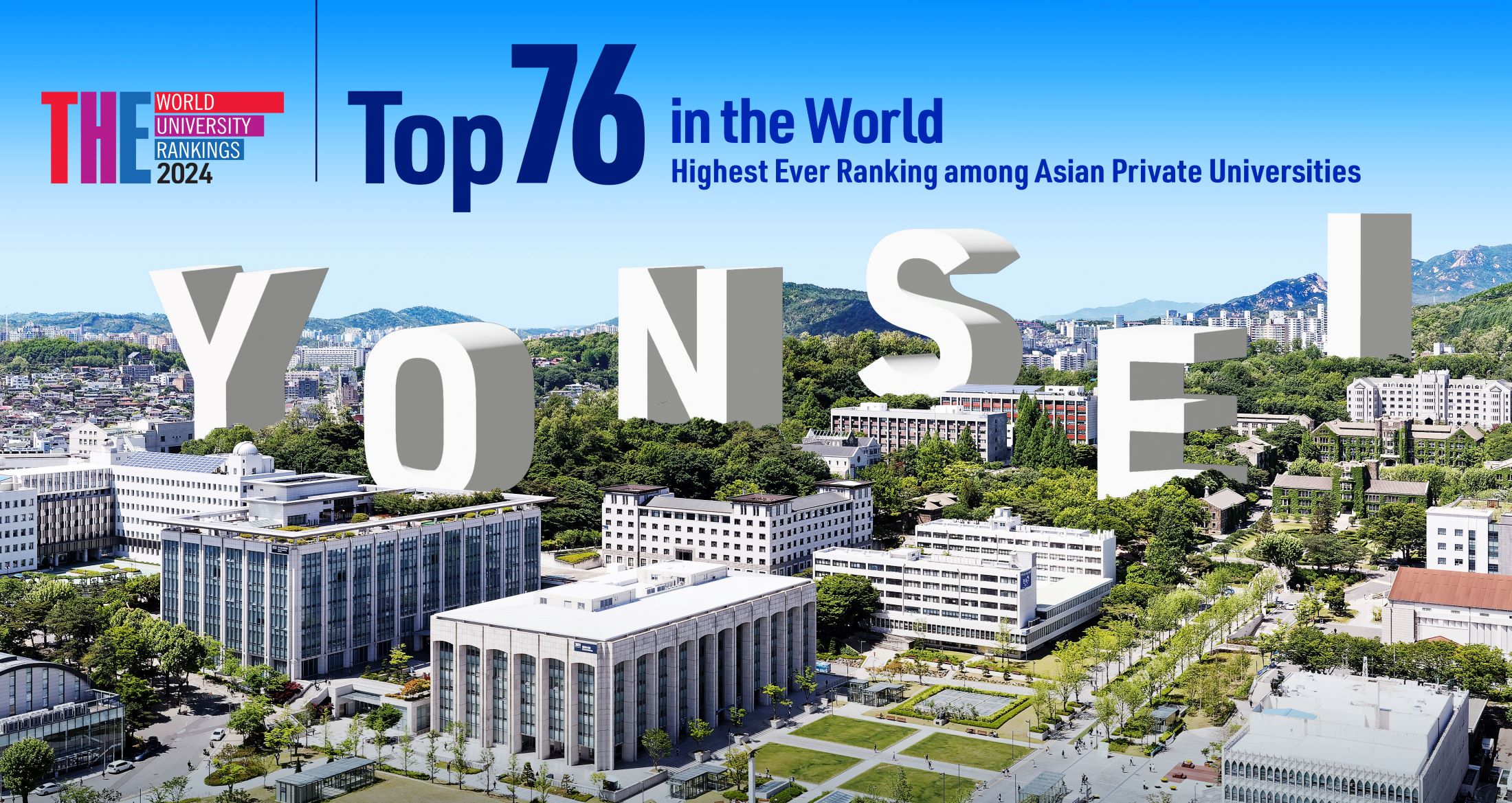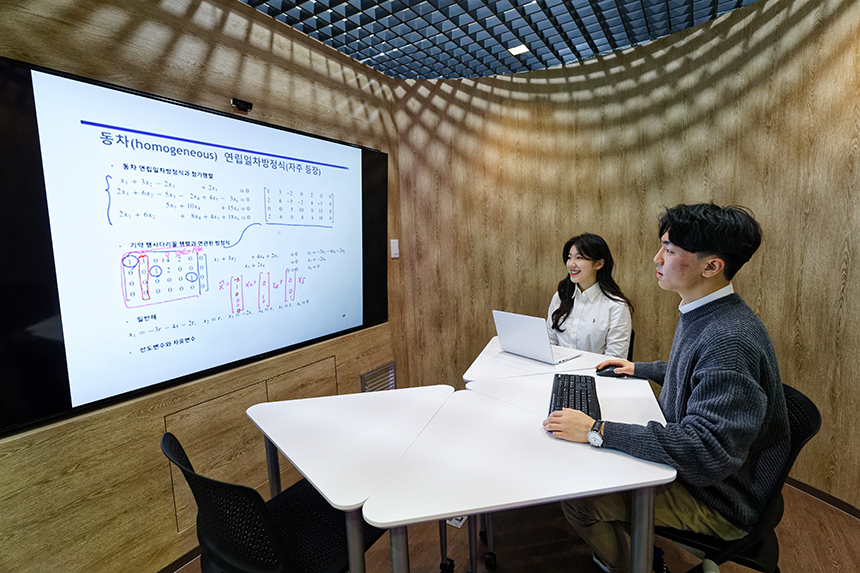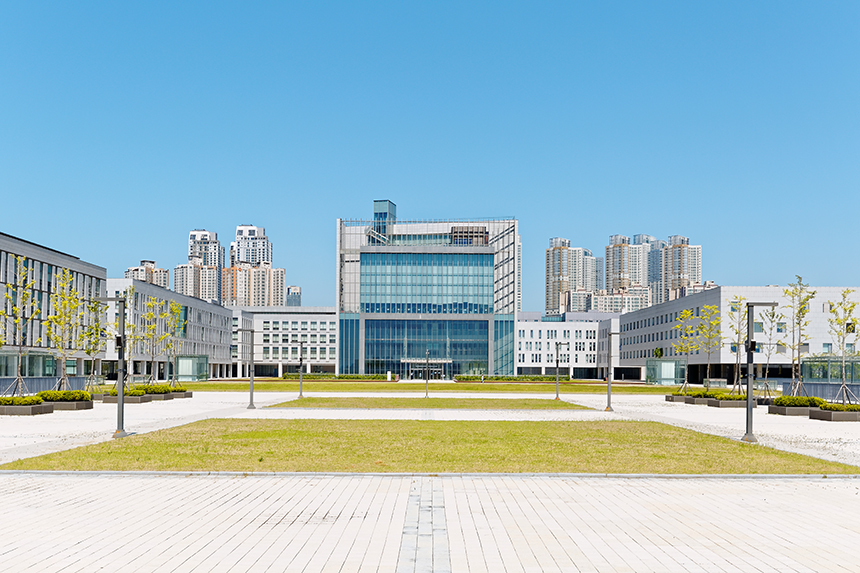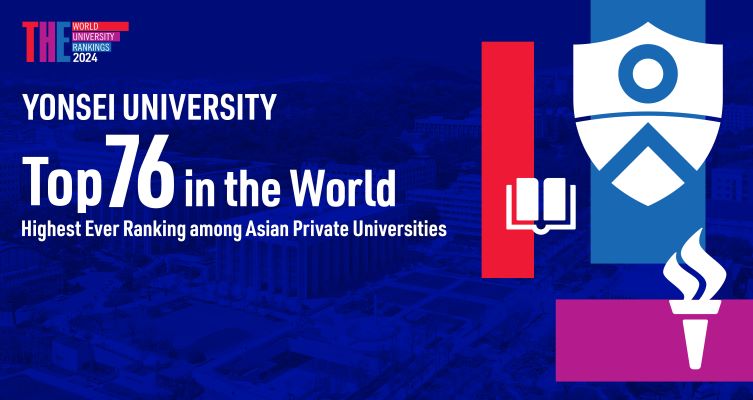- Yonsei University Ranks Highest Ever Ranking among Asian Private Universities in the THE World University Rankings 2024 September 27, 2023
-
With Increased Scores in Research Citations and Industry Collaboration, Attaining Top 76th in the World

Our university achieved Top 76th in the world in the 2024 THE World University Rankings, as announced by THE (The Times Higher Education), a prominent global university assessment organization, on September 27th. This marks our highest ever ranking among Asian private universities.
In last year's THE assessment, our university made a quantum leap, securing the 78th spot globally and becoming the top-ranked private university in Asia. This year's announcement, with a 2-step improvement from last year, once again positions us at the top among Asian private universities for the second consecutive year. The 76th global ranking not only represents our university's best-ever performance but also holds even greater significance, as it is the highest rank achieved by an Asian private university since THE first began publishing university rankings in 2004.
Our university's recent achievement follows its impressive 76th place ranking in the QS (Quacquarelli Symonds) World University Rankings last June. As a result, our university has solidified its position as a leading university in Asia, ranking in the top 70 in both of the world's major university assessments known as THE and QS World University Rankings, and maintaining its status as the number one private university in Asia.
In response to the changing landscape of higher education and the evolving role of universities in society, THE introduced significant changes to its evaluation criteria for this year's assessment. The assessment now encompasses five evaluation areas and 17 sub-indicators, with the following weightings: Teaching (29.5%), Research Environment (29%), Research Quality (30%), International Outlook (7.5%), and Industry Collaboration (4%). This year, a total of 1,904 universities worldwide were ranked in THE's evaluation.
Our university received excellent evaluations in key areas, ranking 29th globally in industry collaboration, 47th in teaching conditions, and 69th in research performance. The introduction of a new indicator in industry collaboration, the 'number of patents citing university papers,' contributed significantly to our rise in the rankings. In the past, research citations were evaluated using only one metric, Citation Impact (average FWCI), but this year, the evaluation criteria for research quality have been diversified with four metrics: Citation Impact, Research Strength, Research Excellence, and Research Influence. Our university received high ratings in these updated metrics, resulting in an improved ranking.

Shifting Paradigms in Higher Education for a Boundaryless, Hyperconnected Era
In September 2021, our university took the pioneering step as the first domestic higher education institution to open the knowledge-sharing platform 'LearnUs' to the general public, leading the way in the media revolution and knowledge dissemination in higher education. Building on the validation of our exceptional human resources and accumulated educational and research achievements, we have provided excellent and trustworthy content, catalyzing innovation in knowledge-sharing. LearnUs is playing a leading role in addressing educational disparities in marginalized communities and local societies, striving to create a sustainable world where no one is excluded from quality education. Currently, LearnUs offers over 5,000 high-quality educational videos to more than 30,000 individual members. Additionally, a 'Online Collaborative Lecture Network,' involving 25 universities, is built on the foundation of LearnUs. This network, aimed at providing high-quality education through the open sharing of educational resources, is planning to expand its membership to overseas universities in the future.
To promote interdisciplinary education, unhindered by the boundaries of majors, we have implemented the Micro-Major system. Through a flexible academic framework, we provide opportunities for students to take various major subjects, cultivating innovative talents with interdisciplinary thinking capabilities. In order to offer interdisciplinary education to all students, we established the Artificial Intelligence Convergence College in 2022. What initially began as a pilot program in some departments in the 2022 academic year has been expanded into majors encompassing humanities, social sciences, natural sciences, and medicine. The long-term plan is to ensure that AI convergence education is accessible to students in all majors.

Creating Global Impact Through Convergence and Industry Collaboration
Our university is actively working towards establishing a new model for the university campus, with the goal of creating an 'Education-Research-Industry-Healthcare Innovation Cluster' centered around the Yonsei International Campus. Following the first phase campus with a focus on education and internationalization, we are now progressing sequentially with the second phase, 'Yonsei Science Park (YSP),' which emphasizes advanced research and industry collaboration. Various programs are being developed, and infrastructure is being built to realize this vision.
Recently, in collaboration with the city of Incheon, our university successfully attracted the main campus of the Ministry of Health and Welfare's 'Global Bio Campus Construction Project' to our International Campus. This project aims to train bio-specialized professionals in low- and middle-income countries and is another significant achievement following the 'K-NIBRT Project' and the 'K-Bio Lab Hub Construction Project.' In addition, with the completion of the Songdo Severance Hospital, which aims to become a hub for the bio-industry, the Songdo Bio Cluster is expected to make significant strides.
In the first half of 2024, a 127-qubit quantum computer will be installed on our International Campus, making South Korea the fifth country in the world to possess a quantum computer. We have also established partnerships and collaboration networks in quantum research with domestic and international institutions, including hosting Joint Symposium on Quantum Computing with Keio University and National Taiwan University, as well as signing collaboration agreements with major domestic universities like KAIST and POSTECH. Our university is poised to lead the quantum ecosystem through cutting-edge research utilizing quantum computers, accelerating progress in quantum technology and its applications.
show mobile menu
mobile menu




